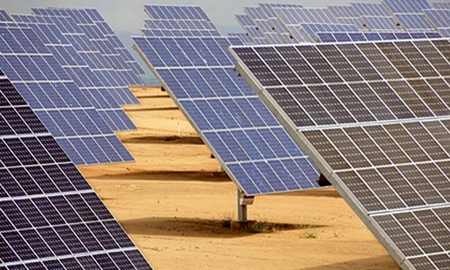Astonishingly, the entire energy demand of Western Europe could be covered 60 times over with the solar energy potential of the Sahara desert, according to the Algerian government.
Given such enormous energy producing potential, it is unsurprising that Algeria has ambitious plans for developing renewable energy both for its own use and for export.
The government plans to invest more than $20 billion(£12.8 billion) in renewable energy over the next 20 years. Minister of Energy and Mines Youcef Yousfi says development of renewables – primarily solar, but also wind and geothermal energy – is a key strategy for the country.
Later, nuclear energy will be included in the country’s energy mix, with plans to build a commercial nuclear power station around 2020, followed by others at five-year intervals.
“Our target is to produce 40 per cent of our electricity from renewables in around 20 years,” says Mr. Yousfi. “It is an ambitious and visionary programme.”
According to a study carried out by the German Aerospace Centre for the German Ministry of Energy, Algeria has a solar thermal potential of 169 terawatt-hours a year and 13 terawatt-hours a year of photoelectric energy. The authorities aim to produce 22,000 megawatts of electricity by means of new and renewable energy by 2030 – more than twice the current capacity using natural gas. Around 10,000 MW will be for export with a guarantee of long-term purchase. The programme provides for the establishment of 60 solar photovoltaic and solar thermal, wind farms and hybrid power plants.
Algeria inaugurated the first hybrid solar and gas power plant in the Middle East and North Africa (MENA) region last year, and already has a deal to export solar power to Europe. Sonelgaz, the state-owned utility in charge of electricity and gas distribution has signed an agreement to export solar power to Europe, with a memorandum of understanding to cooperate with the European Desertec Initiative, which aims to power the European grid with solar energy.
To be financed from taxes raised from oil exports, the renewable energies programme is expected to create between 100,000 and 200,000 jobs. It is expected to save around 600 billion cubic metres of gas over 25 years, half of which will be exported to provide revenue for the country.
The initial stages will be experimental – pilot projects, testing and adapting equipment in hostile environmental conditions such as sandstorms, investigating the most effective areas for wind energy and exploring the potential of geothermal energy.
“Finally, we will launch the programme on a massive scale based on the results of our experiments,” says the Minister, adding that the key to success lies in training and developing technology. “We want to make all the equipment here. It will create jobs, reduce costs and improve our technological capabilities. If we can adapt these technologies to our climatic conditions, it will be a gigantic step.”
Mr Yousfi believes Algeria’s long-term energy mix will have to include nuclear energy to cope with the country’s growing power demand.
“We have high quantities of uranium and will train people to prepare them,” he says. “We have created an institute of nuclear engineering, and the target is to have the first nuclear reactors ready when we need them. We are totally convinced that from that point the technology and security will be advanced enough to deal with the needs of our nuclear energy sector.”
The Minister maintains that in ten years Algeria’s commitment to renewable energy will serve as a model for other countries starting to deplete their hydrocarbons reserves.
“It will depend on the speed of the implementation of the techniques and technologies required to fulfil the programme, but we are keen to be at the front and to move forward,” he says.

0 COMMENTS